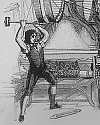 (source)
(source)
|
Albert Einstein
(14 Mar 1879 - 18 Apr 1955)
German-American physicist who developed the special and general theories of relativity. He was awarded the 1921 Nobel Prize for Physics for his explanation of the photoelectric effect.
|
Albert Einstein
“Our exalted technological progress”
Illustrated Quote - Medium (500 x 350 px)
More Albert Einstein quotes on science >>
This quote is a translation into English from a letter written to his friend Heinrich Zangger on 6 Dec 1917. Einstein was then living in Berlin, Germany. World War I, which had begun on 1 Aug 1914, was still in progress. He had joined the pacifist Bund Neues Vaterland,. Thus his comments at this time show he had concerns about the misuse of advances in science, decades before atomic bombs were created.
In 1906, Henrich Zangger had asked Einstein for advice in a patent matter. They maintained a long exchange of letters until 1947. Zangger was a Swiss toxicologist, a professor of forensic medicine at the University of Zurich (appointed 1905). Einstein received his awarded a doctorate from the University of Zurich in April 1906, and had been working at the Swiss Patent Office in Bern (applied Dec 1901, left 1909). By 1917, Einstein had already formulated his theory of relativity (special and general).
During the years of World War I, Einstein and Zangger exhanged several letter expressing dismay at the atrocities and ravages of the war. Einstein's strong sense of moral urgency is demonstrated in his private letters. As given by a different translator of his Dec 1917 letter to Zangger, Einstein wrote
How is it at all possible that this culture-loving era could be so monstrously amoral? More and more I come to value charity and love of one’s fellow being above everything else. … All our lauded technological progress—our very civilization—is like the axe in the hand of the pathological criminal.
Ironically, Einstein contributed peripherally to that wartime use of technology. In the summer of 1916, he published a short paper, Elementary Theory of Waves in Water and of Flying. In this paper, he gave some thoughts on the shape of aircraft wings, though his idea of a hunch-backed wing went nowhere. Also, in a patent dispute about a gyrocompass design, Einstein contributed his opinion about an experimental examination.
Zangger would later publish Vergiftungen (“Poison Control,” 1924), in which he pointed out numerous new poisoning hazards relating to the development of technology, together with how to combat them with prevention, diagnosis and therapy.
- Science Quotes by Albert Einstein.
- 14 Mar - short biography, births, deaths and events on date of Einstein's birth.
- Albert Einstein - My Theory - The Times (1919).
- Geometry and Experience - Address by Albert Einstein to the Prussian Academy of Sciences (27 Jan 1921).
- Even Einstein's Little Universe Is Big Enough - New York Times article (2 Feb 1921).
- Large color picture of Albert Einstein (850 x 1000 px).
- Albert Einstein - Context of “God … integrates empirically” quote - Medium image (500 x 350 px)
- Albert Einstein - Context of “Laws of mathematics refer to reality” quote
- Albert Einstein - Context of “Laws of mathematics refer to reality” quote - with Large image (800 x 600 px).
- Albert Einstein - Context of “God … integrates empirically” quote - Large image (800 x 600 px)
- Albert Einstein - context of quote Mathematics…a product of human thought - Medium image (500 x 350 px)
- Albert Einstein - context of quote Mathematics…a product of human thought - Large image (800 x 600 px)
- Albert Einstein - context of quote “Politics is more difficult than physics” - Medium image (500 x 350 px)
- Albert Einstein - context of quote “Politics is more difficult than physics” - Large image (800 x 600 px)
- Albert Einstein - context of quote “Science without religion is lame; religion without science is blind.” - Medium image (500 x 350 px)
- Albert Einstein - context of quote “Science without religion is lame; religion without science is blind.” - Large image (800 x 600 px)
- Albert Einstein - context of quote The Lord God is subtle - Medium image (500 x 350 px)
- Albert Einstein - context of quote The Lord God is subtle - Large image (800 x 600 px)
- Albert Einstein - context of quote Imagination is more important than knowledge - Medium image (500 x 350 px)
- Albert Einstein - context of quote Imagination is more important than knowledge - Large image (800 x 600 px)
- Albert Einstein - context of quote A theory can be proved by experiment - Medium image (500 x 350 px)
- Albert Einstein - context of quote A theory can be proved by experiment - Large image (800 x 600 px)
- Albert Einstein - context of quote Falling in love is not at all the most stupid thing - Medium image (500 x 350 px)
- Albert Einstein - context of quote Falling in love is not at all the most stupid thing - Large image (800 x 600 px)
- Albert Einstein - context of quote That is relativity - Medium image (500 x 350 px)
- Albert Einstein - context of quote That is relativity - Large image (800 x 600 px)
- Albert Einstein - context of quote “One thing I have learned in a long life” - Medium image (500 x 350 px)
- Albert Einstein - context of quote One thing I have learned in a long life - Large image (800 x 600 px)
- Albert Einstein - context of quote “Why is the electron negative?” - Medium image (500 x 350 px)
- Albert Einstein - context of quote “Why is the electron negative?” - Large image (800 x 600 px)
- Albert Einstein - context of quote “The formulation of a problem is often far more essential than its solution” - Medium image (500 x 350 px)
- Albert Einstein - context of quote “The formulation of a problem is often far more essential than its solution” - Large image (800 x 600 px)
- Albert Einstein - context of quote “Our exalted technological progress” - Large image (800 x 600 px)
- Albert Einstein - context of quote “There exists a passion for comprehension” - Medium image (500 x 350 px)
- Albert Einstein - context of quote “There exists a passion for comprehension” - Large image (800 x 600 px)
- Albert Einstein - context of quote “An equation is for eternity” - Medium image (500 x 350 px)
- Albert Einstein - context of quote “An equation is for eternity” - Large image (800 x 600 px)
- Subtle Is the Lord: The Science and the Life of Albert Einstein, by Abraham Pais. - book suggestion.
- Booklist for Albert Einstein.









